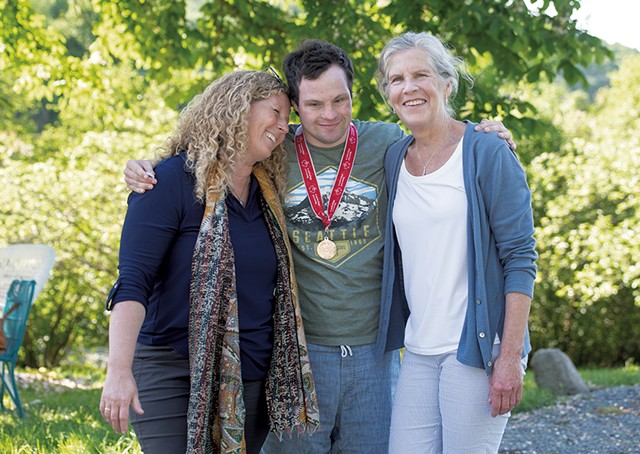
- Daria Bishop
- From left: Hannah Schwartz, Jesse Campbell and his mom, Elizabeth Campbell, at Riverflow in Monkton
In 2021, Elizabeth Campbell founded a nonprofit organization in hopes of creating a home where people with disabilities, including her son, could receive 24-hour care in a family-like setting.
She didn't expect to find the perfect place right away. But the day her Developmental Disabilities Housing Initiative was awarded $170,000 from the state last summer, she discovered what she was looking for: a 1970s-era home with eight bedroom suites and vaulted ceilings on 30 acres of land in Monkton.
"We hadn't planned on buying a house," Campbell said. "It wasn't in the cards" so early in the process. Her family and others who are part of the group chipped in for a down payment and borrowed to secure the $925,000 property.
Now the project has a home, a board and a name: Riverflow Community. The group is spending $425,000 to renovate the house this summer for a move-in that could happen as early as October. Four young adults with developmental disabilities, a pair of house managers and some helpers will live under the same roof, sharing meals.
Campbell hopes Riverflow will provide a more stable alternative to the settings that for decades have defined life for most of Vermont's developmentally disabled adults. The state closed its large central home for those individuals, the Brandon Training School, in 1993 amid a national movement toward integrating people with disabilities into the community instead of having them live separately.
Since then, almost all the Vermonters who need constant supervision and care have been in what state and advocates call "shared living," a kind of adult foster care where a family is paid to house and support one or two individuals. The problem with that system, Riverflow's founders say, is that it's inherently unstable. Host families are scarce, and when a family decides to stop providing care, the person they have been housing often has to move away from friends and community to another, distant setting.
The grant that Riverflow's founders received last summer was one of three awarded to groups working on alternatives to state-provided systems of care.
Kirsten Murphy, executive director of the advocacy group Vermont Developmental Disabilities Council, said young people who have been part of mainstream educational settings throughout childhood find themselves at a loss when they graduate from high school.
"We have a generation of people coming up through special ed who have been in inclusive classrooms their whole life, and they say, 'Why would I want to live with another family?' They want to live in an apartment with their friends," Murphy said. "That's not a model the state has chosen to make workable."
Campbell, a practicing psychoanalyst who lives in Shelburne, created Developmental Disabilities Housing Initiatives after her husband, Bruce, died at 62. Together they had cared for their son, Jesse, who has Down syndrome and cannot be left at home alone. Now 67, Campbell doesn't know how much longer she'll be able to help him with his daily needs. Her goal is to find him a long-term home with other people closer to his age.
Her parent advocacy group lobbied for the planning grants that have helped Riverflow get off the ground.
Among her partners in creating the home are Jim and Amy Caffry of Waitsfield, whose 23-year-old son, like Campbell's, needs round-the-clock care and supervision. Jim Caffry is a lawyer who specializes in planning for people with special needs. To guide the group, they've hired Hannah Schwartz, a veteran social worker who in 2000 created Heartbeet Lifesharing, an intentional community in Hardwick for developmentally disabled adults. This summer, Schwartz will become Riverflow's executive director.
In a long-term home, residents develop the relationships and routines that enrich life for all, said Schwartz, who grew up on an agricultural intentional community in Pennsylvania and has spent her career in the field. More than two decades ago, she founded Heartbeet on a farm she purchased for $250,000. Now, 36 people live at the licensed therapeutic residence that is part of a national network called Camphill Association of North America.
Schwartz said Heartbeet's residents develop circles of friends and acquaintances that are critical to their well-being. She described a nonverbal Heartbeet resident who swims regularly in Stowe.
"He's hugely known and well liked in the Hardwick area," she said.
Williston resident Marla McQuiston, whose 26-year-old son has Down syndrome, has known Campbell for years and is part of another group that received a state planning grant. She's working with Champlain Housing Trust and other agencies to create a shared-living facility with about a dozen one-bedroom apartments in a building on St. Paul Street in Burlington. CHT, the state's largest affordable housing agency, would own and manage it.
Like Campbell, McQuiston wants stability for her son Justin, who graduated from Champlain Valley Union High School. He wouldn't get that, she said, if his living situation could change suddenly.
"Anywhere in CVU territory, people say hi to Justin," she said. "I don't know who they are, he doesn't always know who they are, but because he was in the high school for six years, a wide range of kids know him."
The third group to receive a grant, the Randolph-based nonprofit Upper Valley Services, is working with Downstreet Housing & Community Development, an affordable housing agency in Barre, to create a multiunit apartment building in Waterbury that would include four spaces for people with developmental disabilities.
Advocates and state officials estimate about 600 adults in Vermont require daily support. Some can live independently in an apartment with supervision; others need around-the-clock care.
Campbell, Schwartz and others emphasize that they want to add options, not replace what's already provided. It's a complicated path. Policy makers worry about the potential for abuse in such situations; the Brandon school closed after reports of inhumane conditions in similar facilities around the country.
Jen Garabedian, director of the state's Developmental Disabilities Services Division, said Vermont has limited the use of group homes for decades, "as a way to sort of ensure that we don't move down a slippery slope back to larger congregate settings."
She added that the state's existing system, often referred to as adult foster care, has worked well for many. She described families who have had yearslong loving relationships with the adults in their keeping. It's also much less expensive than the kind of home envisioned by Riverflow's founders, she noted — a critical consideration.
"While we are tasked with offering authentic choice, we are also required to provide services at the most cost-effective level to meet someone's need," she said. "Those things are sometimes at odds with each other."
But she agreed with Schwartz and Campbell that shared living's not right for all.
"We really need to do better," Garabedian said. "We're working with partners like the Riverflow Community to learn from their experience to see what can be replicated across the state."
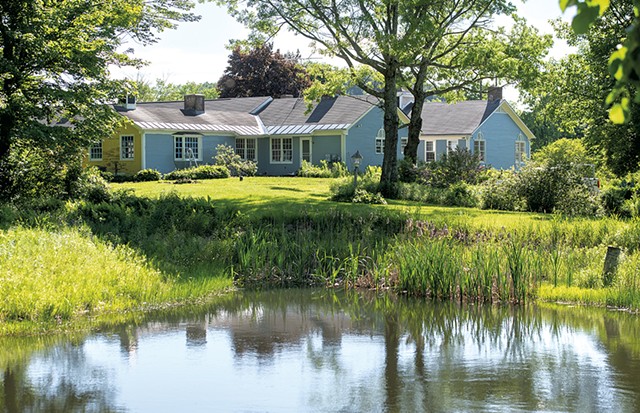
- Daria Bishop
- Front view of Riverflow in Monkton
At Riverflow, residents' Medicaid and Social Security benefits will pay for their continuing care, Campbell said. Schwartz suggested that the handful of staff members who provide that care will likely be young people who are interested in a career in social services and are willing to work for little more than room and board.
The proposed community has lofty ambitions. Ultimately, its founders would like to join Heartbeet as a member of Camphill, the worldwide network of communities where people with and without disabilities live together, often in agricultural settings. That could take years, Campbell and Schwartz said. They'd also like to build more housing on the property, to provide for up to 16 people.
During the pandemic, the state temporarily paid parents to care for their adult children at home, something that advocates had been pushing for. The Vermont Department of Disabilities, Aging and Independent Living has created a permanent policy that will go before the legislature's rulemaking process next year. If it passes, the change will be implemented.
Campbell said she supports that option, though it's not a replacement for Riverflow.
"It doesn't solve the problem of what happens to our adult children with developmental disabilities once their parents inevitably are no longer able to care for them due to old age or death," she said. "So in some ways, it's kicking the can down the road."
Murphy, of the Developmental Disabilities Council, said she supports Riverflow. But, she noted, it relies on founders who have the means and connections to raise money for the property purchase, renovation and maintenance. That model won't work for hundreds of people who need consistent care.
"The two other projects in the planning grants are more scalable," she said.
Murphy is critical of the way the state has for years steered clear of providing almost any group home settings for adults with disabilities, but she also acknowledges that it is constrained by a tangle of federal rules, some contradictory, others counter to local goals for housing the disabled.
"There are really, really good people, and we have some really good aspirations, but we have very badly underfunded the system and have failed to take advantage of opportunities in federal rules that would make it better," Murphy said. "We like to do our own thing."
Campbell said getting to know people with developmental disabilities helps raise awareness that conventional measures of success, such as wealth and power, are not the only markers of a good life.
"Great cognitive ability is not the answer to everything. Look at the world the brightest of us have created, the Harvard, Yale and Princeton graduates," Campbell said. "It's a mess."
The most important forces in her son's life, she said, are music and people. At get-togethers with family and friends, she said, he often inspires unskilled dancers to cut loose on the dance floor.
"Dancing with Jesse, everyone relaxes because there's no judgment," Campbell said. Her son doesn't worry about how he looks when he's enjoying the music. "I think he's kind of a corrective for a more ego, winner-take-all perspective that our culture has embraced."





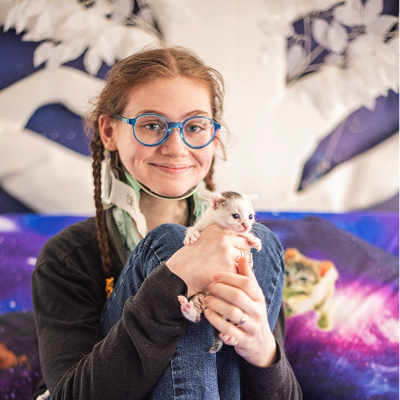
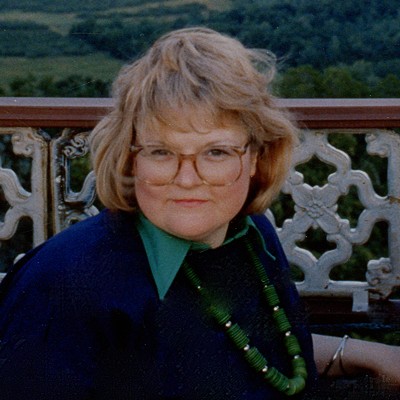
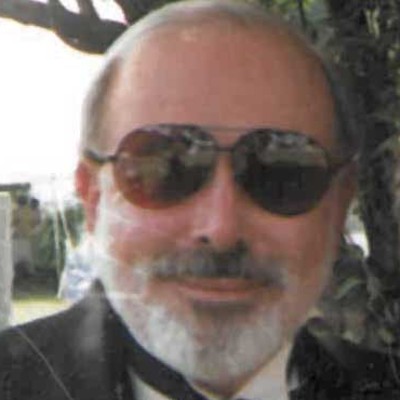
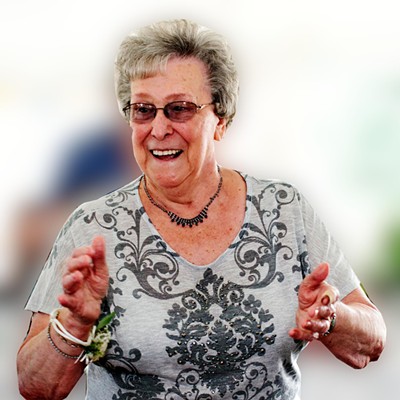
Comments
Comments are closed.
From 2014-2020, Seven Days allowed readers to comment on all stories posted on our website. While we've appreciated the suggestions and insights, right now Seven Days is prioritizing our core mission — producing high-quality, responsible local journalism — over moderating online debates between readers.
To criticize, correct or praise our reporting, please send us a letter to the editor or send us a tip. We’ll check it out and report the results.
Online comments may return when we have better tech tools for managing them. Thanks for reading.